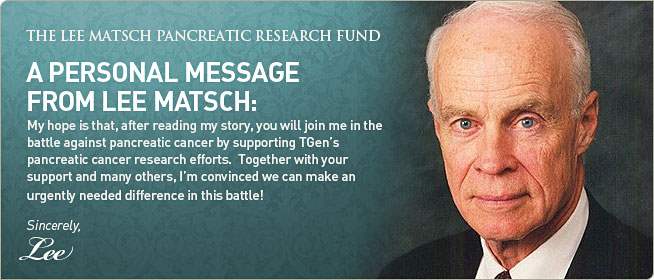
Lee's Story
In September, 2006, I'd been semi-retired for about 8 years and seemingly enjoyed excellent health, when abruptly my life changed. I suddenly developed acid reflux and the symptoms of jaundice. My family physician directed me to the emergency room of our local hospital, where I underwent a series of tests. It turned out that my bile duct was totally closed by a cancerous tumor at the junction with the pancreas. I was told I needed a "Whipple" operation.
My first good fortune was that the tumor caused the jaundice symptoms, because it would have otherwise gone undetected at that stage.
My second good fortune was that my wife Diane's brother is Dr. George Paul Noon, Professor of Medicine at Baylor Medical School in Houston and former Executive Director of the Multi-Organ Transplant Center at the Methodist Hospital. George immediately lined me up with Dr. Wade Rosenberg at Methodist, who performs upwards of 60 "Whipples" per year, and whom George had trained in this procedure. Diane and I headed for Houston and within a few days Dr. Rosenberg successfully performed the very complex procedure. Dr. George Noon, Dr. Rosenberg and Dr. Atilla Ertan, FACP, MACG at Methodist Hospital guided my recovery during my 30 day hospital stay.
My third good fortune was that my friend, John McGrath, at the University of Arizona put me in contact with Dr. Daniel Von Hoff, TGen's Physician in Chief. Dr. Von Hoff dispatched me to his colleague Dr. Halepota at the Virginia G. Piper Cancer Center in Scottsdale, who continues to be my oncologist.
Following my return from Houston I underwent a chemotherapy regimen directed by Dr. Halepota and also consulted with Ms. Terri Taylor, a nutritionist at the Virginia G. Piper Cancer Center who helped me to recover my lost weight caused by the operation. After the treatment, I was declared to be cancer free. However, in the spring of this year (2008) I developed a digestive obstruction that led to the need for a gastrojegunostomy operation, which I had last August, again by Dr. Rosenberg. The operation revealed another cancerous tumor that Dr. Rosenberg was able to largely surgically remove. Following the surgery, I resumed chemotherapy under the direction of Drs. Von Hoff and Halepota. The new regimen involved a treatment that Dr. Von Hoff considered extremely promising and was in a clinical trial stage. Based on the first CT scan, the cancer was deemed to be in remission but I completed the full chemotherapy treatments as added insurance. After completing chemotherapy the second CT scan showed no new cancer.
A few months after chemotherapy was completed, new digestive problems occurred followed by weight loss due to an inability to eat. A new scan showed small tumors had developed in the abdomen. After consulting with Dr. Von Hoff, a molecular profile was done on biopsied tumor tissue and based on the results Dr. Von Hoff determined a new chemotherapy protocol that was expected to be effective against this latest cancer occurrence. Unfortunately during the time it took to determine the next course of action, the digestive problems worsened leading to the placement of a gastrostomy tube (G-tube) because the stomach was unable to empty. TPN (Total Parenteral Nutrition) was started for nutrition until a jejunostomy tube (J-tube) could be inserted for better nutrition delivery. The hope was the J-tube feeding would allow better nutrition and help increase my weight and strength in preparation for the new chemotherapy regimen. Unfortunately the scheduling of the J-tube took longer than anticipated and my condition continued to deteriorate. After complications with the J-tube (it had interfered with the method of feeding) and after much consideration I decided not to undergo further chemotherapy. My quality of life had diminished so much that I did not see the point in trying to do anything that might diminish it further and could not guarantee any long term positive results.
For a man who was physically active his entire life, this was not a good existence. Lee began Hospice on June 26, 2009 and lost his battle with pancreatic cancer on July 21, 2009.
Until being diagnosed with pancreatic cancer, Lee was unaware of the daunting statistics associated with the disease. Pancreatic cancer is a genetic disease, and its mutations are distinctly different from other forms of cancer. The key to unlocking prevention is to exploit its genetic diversity, but so far full preventive therapies have been extremely difficult to develop.
Lee established the Lee Matsch Pancreatic Research Fund at TGen to help raise awareness and support for this deadly disease.
To learn more about TGen's pancreatic cancer research program, please click here.
If you would like to make an online gift to support pancreatic cancer research, please click the donate button above. You may also send a gift by mail to TGen Foundation, 445 N. 5th Street, Suite 120, Phoenix, AZ 85004.
